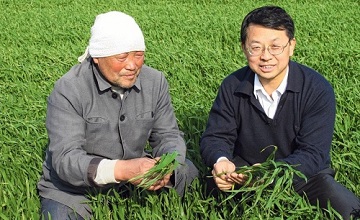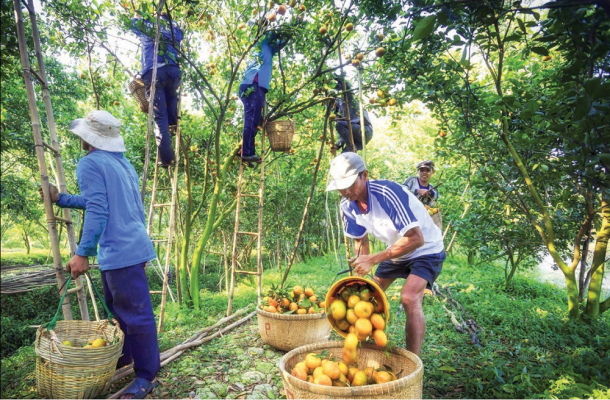Fusuo Zhang is Professor of ‘plant nutrition’ at China Agricultural University in Beijing. After having achieved PhD at the University of Hohenheim (Germany), he introduced Chinese the use of computer models concerning nutritional needs of crops and limiting fertilizers to the environment. Zhang recently spent a week in Wageningen talking about new joint of PhD students in his project.


Fusuo Zhang (on the right) supervises the crop quality with a farmer on a Chinese rice field
The Chinese agriculture should become more efficient. Therefore, Fusuo Zhang has sent students to live among farmers and to help them for 2 years.
As a child in a farming family, Fusuo Zhang (born in 1960) often suffered famine. He got noodles or bread twice a day. At the university, he could finally afford three meals daily because of his father, who later became a village doctor. “My scholarship was calculated about 500 grams of food per day, not enough for a young man.” He said in Wageningen where he got an honorary doctorate on March 7. Nowadays, Zhang is a research leader at China Agricultural University and one of the most important agricultural advisors for Chinese Government. As a student, and later as a professor, he saw the grain production increase. Only 60 years ago, the Chinese farmers obtained the same low yields as African farmers nowadays with an average of 2 tons per hectare per year. Meanwhile, Chinese grain yields are now yearly on average 6 to 8 tons (the wheat production is over 10 tons in the Netherlands).
China has produced enough rice and wheat to feed its own population since 2013. However, 600 million Chinese farmers have not worked efficiently. Zhang’s team have showed this fact again and again by using new measurements, field tests and computer models. The Chinese farmers have been excessively using artificial fertilizers, causing heavy pollution in lakes and rivers. A publication in Science magazine in 2010 in which his team showed how serious the soil edification was, opened the eyes of the government. Zhang and his team set up a national training programme reaching many small farmers.
More than 20.9 million farmers across China were advised on growing methods based on the results of 13,123 field experiments with corn, rice and wheat. The profit of the trained farmers was on average 10 percent higher than that of non-trained farmers in surrounding villages. The trained farmers produced one third less nitrogen emission, had higher income and less CO2 emissions. The training involved 1,152 researchers from 33 universities, more than 200,000 extension workers and representatives of fertilizer and seed companies.
How do you manage to reach so many small farmers?
“Thanks to efforts of master students. When extension workers, living in the city, had visited a farming village to teach farmers for two or three hours, farmers already have forgotten their advice after one crop season. But if our master students live two years with about 1,000 farmers. With best twenty male or female students, they set up a farmers’ field for less efficient farmers who are often poor and less literate, which creates major differences between the yields of farmers. The best ones got 10 tons of wheat per hectare per year, others do not exceed three per hectare. The last ones learnt the most.”
Do young people want to live in those remote villages?
“At the moment, 300 of these agricultural students are living in such villages. They live there alone, in case of female students, there are two in each village. They haven’t started a family yet and they are very motivated to help farmers. Besides, the local authorities and companies would like to support this. It would be more difficult to reach all those farming families if these students live in cities. “The fertilizer companies (private enterprises and state-owned enterprises) are required to deliver fertilizer pellets designed by the university. The fertilizer composition varies by crop and region. But the farmers must use fertilizer more accurate, use other vegetables, plowing or buy better seeds. Sometimes, farmers don’t always follow advices if they are too difficult to understand. In that case, the researchers will look for ‘interpreters’. In fact, there was not enough labour force to work more accurate because young family members had moved out of the village.”
Wouldn’t Chinese government like to improve large companies? Why do you focus on small farming communities?
Improving large companies will take too much time while land reform would be necessary. Farming households would have to transfer land, which wouldn’t happen so easily. China has 240 million farming households growing 0.6 hectare of wheat and some vegetables. 2 or 3 family members work on each farming household. There is not enough other work for all those small farmers. The small farms in Japan and Korea took 50 years to grow 6 hectares. We expect something similar for China. Only the state-owned enterprises can own 20 hectares or more as in the Netherlands, but these figures only account for about 5 percent of all farming enterprises.”
You are not a member of Chinese Communist Party. How do you get so much influence?
I am a member of one of seven minority parties in China, which helps us give our opinions to the Government on 3 ways:
- Through the Communist Party. Minority parties in China have the role of consultant.
- Through our university. Each year, we write an opinion report.
- Through the Chinese Academy of Sciences. I am a member of an advisory board.
What do you learn from Netherlands?
“Many Chinese farmers are only on elementary school. In Netherlands, I saw how important it is if farmers are properly trained. Dutch farmers (including garden farming) take care of the soil and run their farm as a private company responding to the market. These are things we would like to teach our farmers.
Source: Collect

 Tiếng Việt
Tiếng Việt



